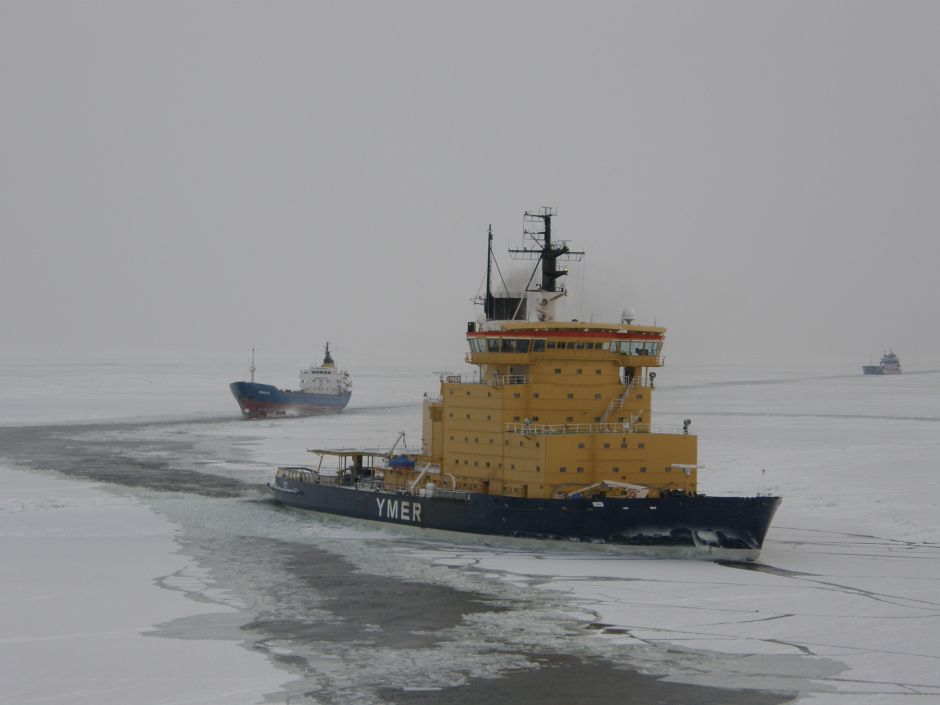Call for projects: Winter Navigation Research Board

The Finnish Transport Safety Agency, the Finnish Transport Agency and the Swedish Maritime Administration in association with the Swedish Transport Agency – hereby invite research institutions and companies to apply for financing of winter navigation research projects for the year 2018.
Read the call below and follow the link to find the form for application.
http://www.sjofartsverket.se/sv/Om-oss/Forskning-och-innovation/Utlysnin...
1. Invitation
Finnish-Swedish cooperation within the Winter Navigation Research Board started in 1972 and is based on annual funding from the maritime administrations of the two countries. The Research Board administers a research programme, which is based on a bilateral agreement between the Finnish Maritime Administration and the Swedish Maritime Administration.
The present parties to the agreement – the Finnish Transport Safety Agency, the Finnish Transport Agency and the Swedish Maritime Administration in association with the Swedish Transport Agency – hereby invite research institutions and companies to apply for financing of winter navigation research projects for the year 2018.
2. Purpose of the call
The maritime administrations in Finland and Sweden cooperate in research and development in order to promote winter navigation in the Baltic Sea and adjacent sea areas. Research and development should focus on the meteorological, oceanographic, technical, and nautical conditions of navigation in ice. The Research Board announces a call on a yearly basis focusing either on parts of the aforementioned subjects, or all of them.
3. Background and motivation
The research programme is based on the fact that Finland and Sweden have long-term cooperation in winter navigation, and a common vision for icebreaking. As a result, the icebreaking fleets nowadays almost work as a single unit. Another important outcome of the cooperation is the introduction and further development of joint Finnish-Swedish ice class rules for merchant ships.
Continuous emphasis on research and development is necessary if Finland and Sweden wish to have an impact on the actual development in the field.
Projects financed in the winter navigation research programme are relatively small. This gives the administrations an opportunity to monitor the projects in more detail. The programme is unique and it also influences international classification societies in their development of ice class rules for merchant ships.
4. Topics of the call
This call focuses on the following four areas:
• Meteorological research
o research related to marine meteorology in winter conditions
o research related to ice formation
o climatologic research related to the aforementioned topics
o development of forecasting and modelling
o development of new tools for presentation of satellite images
• Oceanographic research
o research related to ice conditions at sea or sea water temperature
o sea currents, sea water level and sea waves in winter
o climatologic research related to the aforementioned topics
o development of forecasting and modelling
o development of new tools for presentation of satellite images
• Technical research
o structural design of hulls of ice-going ships
o structural design of propulsion machinery of ice-going ships
o development of minimum engine power regulations for merchant ships
o winterization of merchant ships
• Nautical conditions
o research on the effectiveness of icebreaker assistance
o research on winter traffic flows in the Baltic Sea area.
4.1 Special research topic for 2018
• Despite a decreasing trend in ice coverage in the Baltic Sea, the demand for assisting and towing of merchant vessels by ice breakers has not decreased. Ridged ice and rubble fields are more prevalent than before, necessitating the towing of many merchant vessels. For this reason projects examining the towing arrangements of merchant vessels are especially encouraged to promote solutions that improve the safety and expediency of towing operations.
• Also, projects contributing towards the goal of a more comprehensive weather and ice forecasting system for the Baltic Sea are encouraged. Improved forecasting would make it possible to optimize the use of ice breaking resources more efficiently leading to a more efficient winter navigation system.
5. Requirements for the project
Your planned project shall be in line with at least one of the research areas mentioned above. The project shall start in 2017 or in early 2018, and last for 6 to 24 months. A final report shall be presented in English. If the project continues for more than 12 months, intermediate reporting is required.
6. Evaluation process and criteria
The proposals will be evaluated by the members of the Winter Navigation Research Board, and the Board will make the formal decision about financing.
The following criteria, weighted as indicated, will determine the decision of financing:
• Relevance: how well the project corresponds to the aim of the call (35%)
• Quality: the ability to contribute to the technical and scientific development (15%)
• Viability: the possibility of accomplishing the project (15%)
• Impact: how the results can be used (35%)
7. Budget
The budget for the research projects will be settled on a yearly basis. The annual budget was €200 000 in 2017. If approved projects last for more than one year, this will result in a partially limited budget for the coming year. Co-financing both from research institutions, industry and other funding organisations is always welcomed.
8. Time schedule
Call text available: 27 June 2017
Deadline for applications: 15 September 2017
Announcement of the financing decision: 20 October 2017
Earliest project start: 20 November 2017
9. How to apply
Proposals should be sent by email to the contact persons of the secretariat given below.
The application form for research projects should be used.
The deadline for applications is 15 September 2017. The Winter Navigation Research Board will not consider applications received after the deadline.
10. Content of the application
General information shall contain the items mentioned below. A maximum of one page can be used.
• Project title
• Acronym
• Project summary – maximum 100 words
• Start and end dates
• Funding
• Project manager
• Project organisation
The following parts shall be described in the project outline. A maximum of 5 pages can be used.
• Relevance: Description of needs the project aims at.
• Quality: A short description of the research aims within this area, and the relation of the project to “state of the art” of the technology.
• Viability: Strategy and methodology
• Impact: A plan for how the result will be used and the impact
• Dissemination: How to present the results
• Brief project plan
• Budget and resources
• Relation to other projects: How the project relates to other projects
11. Contact persons
Further information on the call can be obtained from:
Lauri Kuuliala, Finnish Transport Safety Agency
Phone: +358 (0) 50 306 6056
Email:
Göran Rudbäck, Swedish Maritime Administration (SMA)
Phone: +46-(0)708 19 12 28
Email:
Related content:
Call for projects - Finnish-Swedish Winter Navigation Research Board
-
 NextWave – en podd som ska locka unga
NextWave – en podd som ska locka unga -
 Ny studie: Eldrivna pendelbåtar kan effektivisera Stockholms kollektivtrafik
Ny studie: Eldrivna pendelbåtar kan effektivisera Stockholms kollektivtrafik -
 Sjöfartens utsläpp ökar
Sjöfartens utsläpp ökar -
 Sociala relationer påverkar val av bränsle
Sociala relationer påverkar val av bränsle -
 Sjöfartens omställning kräver ”mjukare” påtryckningar
Sjöfartens omställning kräver ”mjukare” påtryckningar -
 Hon hade avtalad tid med Kapten ynkrygg
Hon hade avtalad tid med Kapten ynkrygg -
 Lighthouse omvärldsanalys 2025 – osäkerhet och tullar präglar sjöfarten
Lighthouse omvärldsanalys 2025 – osäkerhet och tullar präglar sjöfarten -
 Se seminariet Shipping in the Marine Environment
Se seminariet Shipping in the Marine Environment -
 Vad betyder egentligen de 90 procenten?
Vad betyder egentligen de 90 procenten? -
 Hålla där...
Hålla där...

